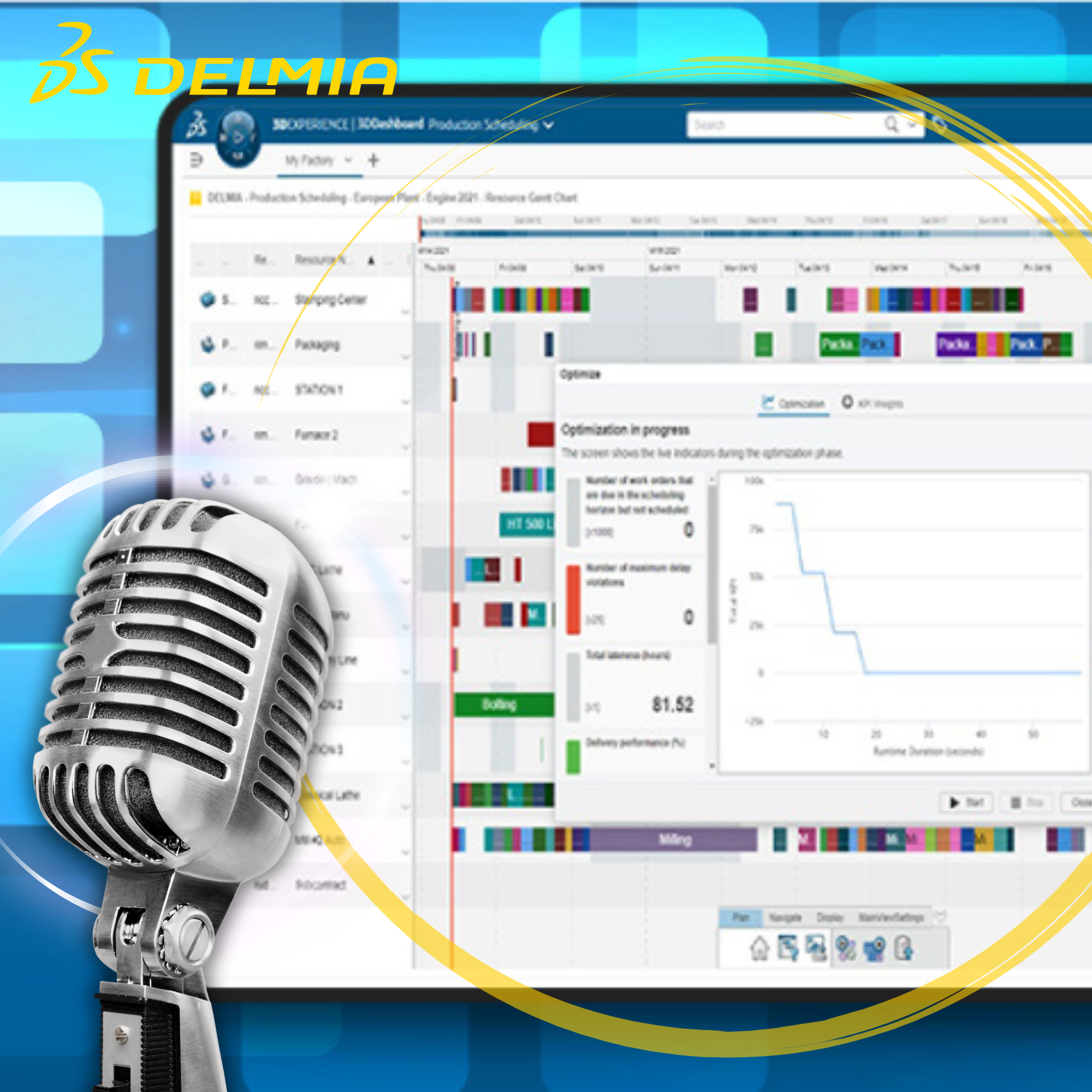Ep: 25 Introducing DELMIA’s Production Scheduling On-Cloud
This episode introduces a new solution on the 3DEXPERIENCE cloud platform, Production Scheduling. Tune in to discover what it is, how it works, and how it can positively impact your business.
Improving business opportunities for our customers
DELMIA’s Production Scheduling On-Cloud: How does it fit in the bigger picture? Production scheduling is a process for our customers. It’s related to detailed scheduling and rescheduling of the resources on the shop. Currently a brand-new SaaS solution on the 3DEXPERIENCE cloud platform is being introduced so this is a cloud-only solution. In a scheduling solution and scheduling process, we assign the right resources to that work and determine the sequence--which is a very complex step for many. Production scheduling provides a way to improve the business opportunities for our customers. What is important for the scheduling solution is typically in between the mass planning—which is MRP, or sales and operations execution, and execution or more.
You can follow the DELMIA "Global Operations on the Go" podcast on Apple podcasts, Spotify, YouTube Podcasts, Deezer, by RSS or wherever you get your podcast


![]()


Meet Our Speaker
Jan Willem
Podcast transcript
SUMMARY KEYWORDS
scheduling, solution, customers, operations, schedulers, work, order, execution, provide, resources, ensure, data, production, important, improve, artificial intelligence, 3d, process, reduce, 3d experience platform
00:15 (Therese)
Hi, and welcome to our DELMIA podcast, Global Operations on the Go. I'm your host, Therese Snow. Today I'm here with Jan Willem, DELMIA Business Operations and Optimization Roles Portfolio Director. We will be discussing a new DELMIA solution called Production Scheduling. Jan Willem, thank you so much for joining us today.
00:36 (Jan)
Thank you for having me, Therese.
00:37 (Therese)
Oh, absolutely. So, before we get started, can you please tell us a bit about your background?
00:42 (Jan)
Okay. I'm a DELMIA R&D Portfolio Manager, and, as such, I'm responsible for the evolution of our products related to planning and scheduling.
00:51 (Therese)
Okay, great. So, let's get started.
So, what exactly is production scheduling, and can you describe it in general terms?
01:05 (Jan)
Okay. Production scheduling is a process for our customers, and it's related to detailed scheduling and rescheduling of the resources on the shop. And what we are now doing is we are introducing a brand-new SaaS solution on the 3DEXPERIENCE cloud platform, so it is a cloud-only solution.
01:22 (Therese)
All right, great. So, say I’m a customer; what kind of value would I expect from Production Scheduling?
01:28 (Jan)
I like your question. Over the past years, I spoke to many different customers. And I think especially since the pandemic, they explained that they have many different difficulties that they have problems coping with. So, if I quickly explain those difficulties that I often see: first, they are often talking about supply chain disruptions. On one end, in terms of supply, because customer behavior is changing, but also on the supply side, because some goods will not be delivered, or they have trouble using the capacity that they have within their own resources. That requires resilience, but also agility. But they also often explain that they have difficulty in terms of employee recruitment or retention. It's difficult to get the right employees and employees are very demanding. And they would like to use actually workforce automation for that; to ensure that their employees can focus on the really value adding act. I also very often hear that sustainability is becoming more important for our customers, so they want to become more efficient and utilize their scarce used resources in the best way possible. And finally, there's also data overload. It's really difficult to bring structure in all of the chaos and leverage all of the data that organizations have available. And I think most of the customers, they are very well aware that they require digital transformation in order to answer most of those challenges that they face, and they asked us to support them. And it's not really a coincidence that, at this point in time, many technologies are very disruptive—because they can provide an answer to many of those challenges that we hear from the field. What are those big technologies that you really need to leverage in order to answer those challenges? Well, first of all, of course, artificial intelligence—and specifically, machine learning, to make sure that you really can grasp all of the data that is available, and that you can take the best decisions. Secondly, the virtual twins—to be able to build a virtual chain of your operations, of your supply chain, and of your products—in order to understand really what's going on and also simulate what any change could do. Analytics and IoT, of course, in order to really bring that order to the chaos and understand and really use the data that is available. And fourthly, also, of course, automation; you need to be able to use the technology to ensure that we can be more responsive, more agile and respond faster. So, we listened very carefully to the voice of our customers and we designed a brand new solution take into account the main strategic pillars from DELMIA operations—which means the solution has to have an intuitive user experience, so it's important to have design to increase visibility and support also collaborative scheduling. Secondly, artificial intelligence and analytics is a very important aspect where we want to provide continuous feedback, real time propagation, exception-based scheduling. Thirdly, we are providing a SaaS solution because our customers are actually asking for a solution that can grow with them the moment that their business actually scales up, or potentially scales down. And of course, we also want to leverage the 3DEXPERIENCE platform with model-based integration to reduce the time-to-market, improve collaboration between schedulers but also other stakeholders of the scheduling process.
04:34 (Therese)
DELMIA already has other scheduling solutions. What makes this one different?
04:38 (Jan)
That is great, you're completely right. We have already two other great solutions and they have their own strengths. So, on one hand we have DELMIA Ortems, which is a very mature solution, and we support our customers with very fast deployments across all of their different sides with this new solution. It is an on-premise solution and it's especially very strong in discrete markets—so in Transportation and Mobility, Aerospace and Defense, Industrial Equipment, Life Sciences, CPG—and that's a very mature solution for those. Second scheduling solution that we have is DELMIA Quintiq scheduler, which is also an on-premise solution, but it's very strong in artificial intelligence. And secondly, we can actually provide a custom fit to exactly what our customers request—and the offer is very interesting, especially for the process market. So, we are addressing many different industries, but specifically in Energy and Materials, but also in CPG; this solution is very, very competitive.
05:30 (Therese)
So, what will happen to those other scheduling solutions?
05:33 (Jan)
Yeah, so this new solution is really an addition to our portfolio. So, all of the scheduling solutions that I just explained—it will speak to a different audience and as such, we will continue to invest also in those solutions to ensure that we stayed better scaling for new but also for existing customers.
05:55 (Therese)
Alright, so how does production scheduling fit into the overall DELMIA operations optimization picture?
06:01 (Jan)
Yeah, so typically, the scheduling solution, it will receive the work that needs to be scheduled from master planning, which can be MRP-run, or it can be sales and operations execution, and that's where we typically get the plant workers from. In a scheduling solution and scheduling process, we assign the right resources to that work, and we also determine the sequence which is a very complex step for many of our customers, and what we do is we improve the business opportunities for our customers. So, for example, what we are doing is we are increasing productivity, which means the resource efficiency, or we are improving the utilization of resources or reduce the setup time or idle time on resources. But we're also doing this: we are increasing delivery performance, so we are making sure that any orders that we are producing or that we are working on that is scheduled within the due dates, which is typically received from mass planning or MRP. And finally, we also decrease inventory—so we reduce the inventory by ensuring that we are scheduling the work at the right point in time when the materials are also available, so we reduce the work in progress. The moment that we're done with scheduling—and we of course need to hand over those firm work orders to execution. So, what is important for the scheduling solution is typically in between the mass planning—which is MRP, or sales and operations execution, and execution or more.
07:18 (Therese)
Does production scheduling integrate with other solutions on the 3DEXPERIENCE platform?
07:23 (Jan)
That is definitely one of the unique values that we can actually provide with this new solution. So, many of our customers, they already designed their virtual twin of their products, virtual twin of their operations on the 3DEXPERIENCE platform. So that means that this new solution actually will ease the way to transformation because it can make use of all of the data that is already available on the 3DEXPERIENCE platform. So, for many of our customers, it’s actually very logical to extend the virtual twin of the operations with the new scheduling process. And that has some really big value; for example, it will definitely reduce the time-to-market—from engineering and new product all the way to execution; it will improve quality because it will be far easier to reschedule work or rework or non-conformance for example; and it also accelerates feedback, because we can take into account feedback from execution, use that in scheduling or use it, for example, in manufacturing engineering. And finally, what will also be a big reason to integrate on the 3DEXPERIENCE platform is collaboration, so it will support to break silos within your organization, improve the collaboration between schedulers—for example, in schedulers working on dependent parts of the plan, for example, when schedulers are responsible for upstream or downstream bottleneck resources—but also with any other stakeholder on a 3DEXPERIENCE platform. But what is important is that we strongly believe in a loosely coupled system. Many of our customers really understand the value of having all of those processes on the platform, but they need some time in order to get to that full support process. And as such, we can also support our customers with only supporting part of these processes.
09:01 (Therese)
So, before we finish, can you please tell our listeners some of the key takeaways?
09:06 (Jan)
Yeah, so Production Scheduling is a brand-new state of the art SaaS solution which takes into account the latest and greatest of what is available on the 3DEXPERIENCE platform, and this is a huge addition to our portfolio. However, there is still a lot of demand for our on-premise solution, and as such, these solutions will continue to receive new valuable functionality in the future to ensure that we are able to bring the most value to all of our customers.
09:30
(Therese) Great. Well, thank you so much for being our guest today.
(Jan) Thank you for having me.
(Therese) Oh, absolutely. And thanks to our listeners for tuning in to DELMIA’s Global Operations on the Go.


